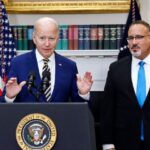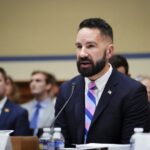By Tom Ozimek
The more than 4,000-page $1.7 trillion “omnibus” government funding bill that President Joe Biden has vowed to sign into law includes around $16 billion in pet projects known as “earmarks” whose supporters see as a way for lawmakers to better serve the needs of their constituents but whose detractors often deride as corrupt and wasteful “pork.”
Earmarks are provisions in legislation that set aside funds for specific projects or programs, typically for the benefit of a particular locality or group.
The omnibus appropriations bill’s 7,200-plus earmarks, formally known as Community Project Funding items, include $750,000 for Gender Non-Conforming Housing in New York (pdf), $1 million for the Rock and Roll Hall of Fame and Museum in Ohio (pdf), $3.6 million for a Michelle Obama Trail in Georgia (pdf), or $5 million for a salmon reintroduction project in Washington state (pdf).
The $1.7 trillion bill passed the Senate on a bipartisan vote of 68–29, with the support of 18 of the 50 Senate Republicans including Senate Minority Leader Mitch McConnell (R-Ky.).
Just nine of the 213 House Republicans backed it. Rep. Kevin McCarthy (R-Calif.), the GOP House Leader, vehemently opposed the bill, calling its passage “one of the most shameful acts” he had ever seen in Congress.
Biden hailed the omnibus bill’s passage in a post on Twitter, calling it “great news for our economy, capping off a year of historic bipartisan progress for the American people.”
“This bill is proof that Republicans and Democrats can come together to deliver for families. I’m ready to sign it into law,” the president added.
Debate Over Earmarks
There is ongoing debate about the use of earmarks in legislative decision-making, with some arguing they’re an effective way to fund local projects, especially when those projects might not get funded through the normal appropriations process.
“Congressionally-directed spending is just another way I can make sure Washington state communities are heard in the other Washington—whether it’s securing direct funding for salmon recovery, affordable housing, or local infrastructure needs,” Sen. Patty Murray (D-Wash.), the second-ranking Democrat on the Senate Appropriations Committee who secured over $230 million in earmark funds for her state, said in a statement.
Others argue that earmarks tend to benefit specific interests or steer funding to projects that may not be necessary or particularly worthy.
“Earmarks, also referred to as pork-barrel spending or the currency of corruption … have a history of waste and abuse,” Romina Boccia, director of budget and entitlement policy at the Cato Institute, a libertarian think tank, wrote in a recent analysis of what she described as a “monstrous” omnibus appropriations package.
“Congress should ban earmarks and focus time and energy on fixing the federal government’s unsustainable spending trajectory instead,” she added.
After a decade-long ban, Democrats revived Community Project Funding ahead of fiscal year 2022, which saw $9.7 billion in earmarks from members of both parties.
Rep. Tom McClintock (R-Calif.) introduced an amendment earlier this year to ban earmarks, but House Republicans voted 52–158 against it.
The earmarks in this year’s omnibus amount to slightly less than 1 percent of the roughly $1.7 trillion funding package, a cap Congress imposed when reviving the earmarking process following its longtime ban.
Sen. Ron Johnson (R-Wis.), who offered an amendment to the omnibus bill that would have erased more than 4,000 earmarks, called the Community Project Funding requests a “gateway drug to the massive deficit spending, to the mortgaging of our children’s futures. It has to stop.”
The earmarks contained in the omnibus bill, which passed with some Republican support, include around $45 billion in funding for Ukraine, hundreds of millions of dollars in funding for border protection in other countries like Egypt and Tunisia, and much more.
Rep. Nicole Malliotakis (R-NY) said on Friday’s broadcast of the Fox News Channel’s “The Story” that the nine House Republicans who voted for the omnibus bill were “taking the pork and running” because most of them are retiring.
“If you went through this bill—and I tried, it was 4,100 pages, we tried to do what we could in terms of going through it—you found a lot of wasteful programs, more money being sent to international organizations, more money being sent to umbrellas under the United Nations, more money being spent overseas for all sorts of purposes in other countries while we have American families struggling here at home,” she said.
“It is unfortunate, because I don’t believe that this is in the best interests of the American people,” Malliotakis added, arguing for the need to look for spending cuts rather than finding pet projects to fund.
In a bizarre twist, around $3 billion worth of earmarks went to lawmakers who voted against the omnibus spending package, nearly all of them Republican, according to a Roll Call tally.
Earmark Details
The omnibus earmarks were distributed across 12 agencies, with some of the more notable or bigger-ticket funding requests were the following.
Agriculture, Rural Development, Food and Drug Administration, and Related Agencies (pdf): $7 million for a cereal disease lab in Minneapolis, Minnesota; $4 million each for a sugarcane research unit in Schriever, Louisiana, an agricultural animal genetic engineering centre in Columbia, Missouri, and a waterway conservation project in Twin Falls, Idaho; $2.95 million to address “climate challenges” to agriculture and water quality in New York City, and $1.5 million for a “climate resilient” agricultural research program in Prairie View, Texas.
Commerce, Justice, Science, and Related Agencies (pdf): $17.4 million for a bioscience research facility in Orangeburg, South Carolina; $16.6 million for a workforce development and outreach centre in Scranton, Pennsylvania; $12.3 million for an innovation and education wing at a lab in East Boothbay, Maine; $3 million for an internet of things (IOT) lab in Rome, New York; and $2 million for a climate change impact on water centre in Texas.
Defense (pdf): $8 million for battery magazines in defence applications in Miami, Florida; $5.7 million for soldier performance and readiness in Statesboro, Georgia; and $1.3 million for a Central American open source research initiative in Miami, Florida.
Energy and Water Development, and Related Agencies (pdf): $9.6 million for environmental infrastructure for a U.S. Army Corps facility in New Mexico; $2 million for a water facilities hydroelectric and solar project in Tampa, Florida; $459,000 for a solar panel installation at a YMCA in Nashua, New Hampshire; and $328,000 for an energy efficiency and decarbonization project in South Charleston, West Virginia.
Financial Services and General Government (pdf): $7.5 million for the Jimmy Carter Presidential Library and Museum in Atlanta, Georgia; $6 million for an archive of Alaskan leaders at the Alaska Community Foundation in Anchorage, Alaska; $5 million for a drug-use reduction program in Oxford, Mississippi; $1.66 million for a substance prevention centre in Huntington, West Virginia; and $1 million for exploring cultural linkages between black Marylanders and civil rights movements in other countries in Annapolis, Maryland.
Homeland Security (pdf): $4.2 million for stormwater and sanitary sewer improvements in Beckley, West Virginia; $2.3 million for a levee upgrade in Mayfield, Pennsylvania; $3.5 million for a city dock “resilience and revitalization” project in Annapolis, Maryland; and $2 million for a “climate resiliency” project in Revere, Massachusetts.
Interior, Environment, and Related Agencies (pdf): $3 million for an Alaska Native Justice Center in Anchorage, Alaska; $2.5 million for a community winter access trails pilot program in North Slope Borough, Alaska; $1.3 million for a “climate resiliency” project in Medway, Massachusetts; $1.2 million for the Cascade–Siskiyou National Monument in Oregon; and $575,000 for a mobile buffalo meat processing unit in New Mexico.
Labor, Health and Human Services, Education, and Related Agencies (pdf): $2 million for “green job” workforce development and equipment in Collegeville, Pennsylvania; $1 million for career skills and job counselling at a women’s centre in Kew Gardens, New York; and around $3 million for a half dozen LGBT-related projects and programs, including $500,000 for LGBTQ youth and family services in Lake Worth Beach, Florida.
Military Construction, Veterans Affairs, and Related Agencies (pdf): $99 million for a physical fitness centre annex at Ft. Wainwright in Fairbanks, Alaska; $82.2 million for recruit barracks in San Diego, California; $68.1 million for aircraft airfield pavement improvements on Whidbey Island, Washington; and around $100 million for a half dozen child development centres, including $32.1 million for one in Camp Pendleton, California.
Transportation, and Housing and Urban Development, and Related Agencies (pdf): $3.75 million for renovation of a YMCA facility in Chicago, Illinois; $2 million for a wax museum on prominent black Americans in Baltimore, Maryland; $1.5 million for an LGBTQ community services centre in White Plains, New York; and $750,000 for transitional housing and services for LGBT and “gender non-conforming” in Albany, New York.
In her analysis of the 4,155-page omnibus legislative text, which is accompanied by another 2,670 pages of explanatory documents, the Cato Institute’s Romina Boccia said that most members of Congress wouldn’t have time to read it before voting.
“And that’s intentional,” she argued, saying that the “current legislative process does not intend for members of Congress to carefully deliberate policy decisions” as doing so would likely result in greater opposition.
“Instead of rushing this bill through this week, Congress should punt [defer] on appropriations until 2023. Members should instead take time over the Christmas holiday to deeply reflect on their responsibilities and return refreshed in the new year with a strong fiscal agenda that would put the U.S. budget on a sustainable path and avert a future fiscal crisis.”
By voting to approve the omnibus and its earmarks, members of Congress have apparently missed the opportunity for deeper reflection, though the question of a future Community Project Funding ban remains open.






